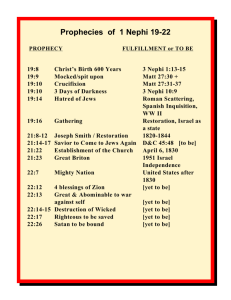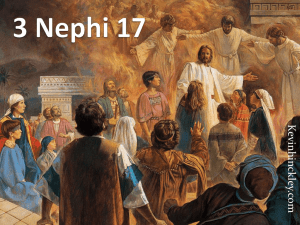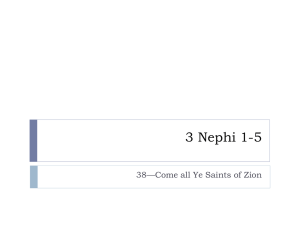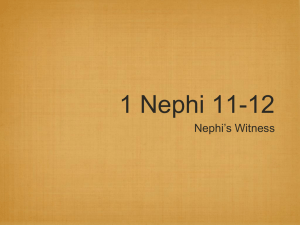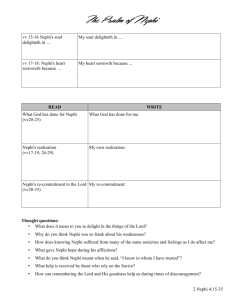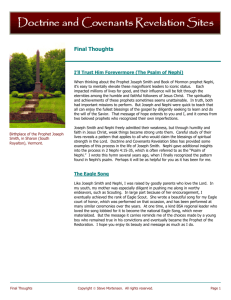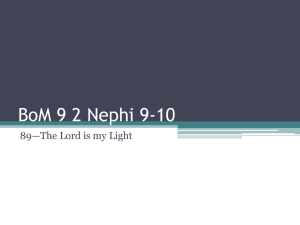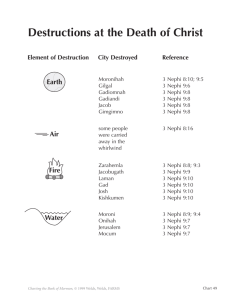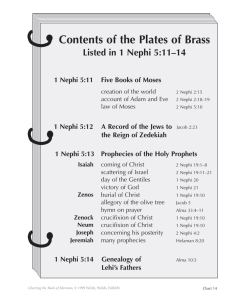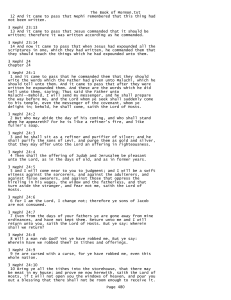1 Nephi 19 - BOM Handouts
advertisement
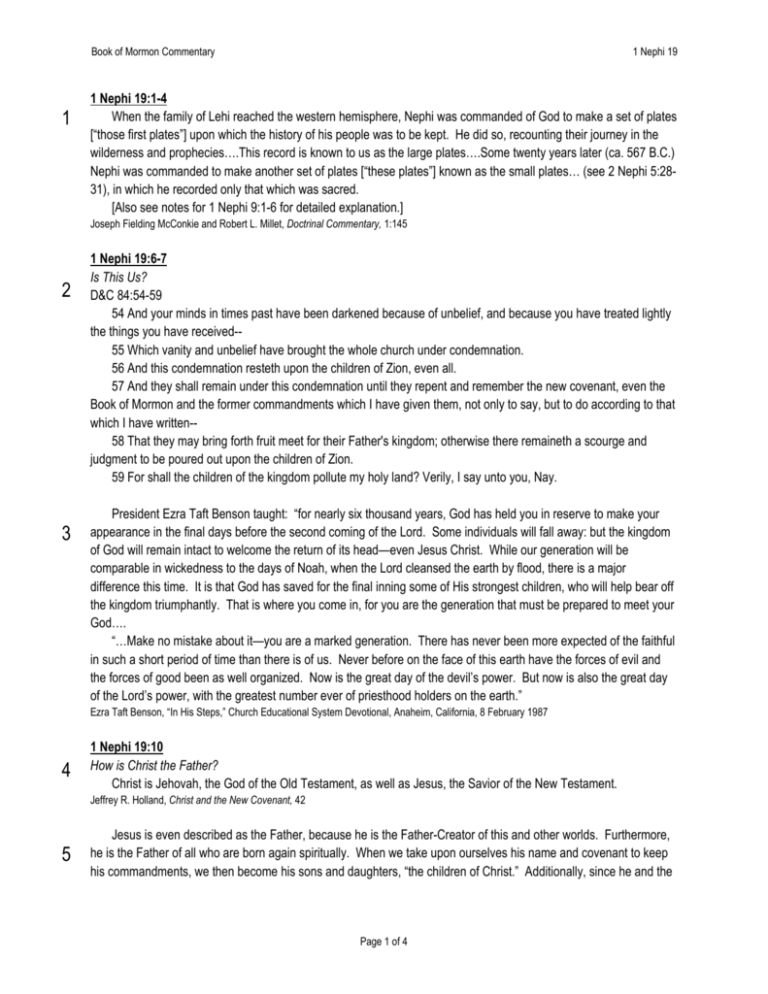
Book of Mormon Commentary 1 1 Nephi 19 1 Nephi 19:1-4 When the family of Lehi reached the western hemisphere, Nephi was commanded of God to make a set of plates [“those first plates”] upon which the history of his people was to be kept. He did so, recounting their journey in the wilderness and prophecies….This record is known to us as the large plates….Some twenty years later (ca. 567 B.C.) Nephi was commanded to make another set of plates [“these plates”] known as the small plates… (see 2 Nephi 5:2831), in which he recorded only that which was sacred. [Also see notes for 1 Nephi 9:1-6 for detailed explanation.] Joseph Fielding McConkie and Robert L. Millet, Doctrinal Commentary, 1:145 2 3 1 Nephi 19:6-7 Is This Us? D&C 84:54-59 54 And your minds in times past have been darkened because of unbelief, and because you have treated lightly the things you have received-55 Which vanity and unbelief have brought the whole church under condemnation. 56 And this condemnation resteth upon the children of Zion, even all. 57 And they shall remain under this condemnation until they repent and remember the new covenant, even the Book of Mormon and the former commandments which I have given them, not only to say, but to do according to that which I have written-58 That they may bring forth fruit meet for their Father's kingdom; otherwise there remaineth a scourge and judgment to be poured out upon the children of Zion. 59 For shall the children of the kingdom pollute my holy land? Verily, I say unto you, Nay. President Ezra Taft Benson taught: “for nearly six thousand years, God has held you in reserve to make your appearance in the final days before the second coming of the Lord. Some individuals will fall away: but the kingdom of God will remain intact to welcome the return of its head—even Jesus Christ. While our generation will be comparable in wickedness to the days of Noah, when the Lord cleansed the earth by flood, there is a major difference this time. It is that God has saved for the final inning some of His strongest children, who will help bear off the kingdom triumphantly. That is where you come in, for you are the generation that must be prepared to meet your God…. “…Make no mistake about it—you are a marked generation. There has never been more expected of the faithful in such a short period of time than there is of us. Never before on the face of this earth have the forces of evil and the forces of good been as well organized. Now is the great day of the devil’s power. But now is also the great day of the Lord’s power, with the greatest number ever of priesthood holders on the earth.” Ezra Taft Benson, “In His Steps,” Church Educational System Devotional, Anaheim, California, 8 February 1987 4 1 Nephi 19:10 How is Christ the Father? Christ is Jehovah, the God of the Old Testament, as well as Jesus, the Savior of the New Testament. Jeffrey R. Holland, Christ and the New Covenant, 42 5 Jesus is even described as the Father, because he is the Father-Creator of this and other worlds. Furthermore, he is the Father of all who are born again spiritually. When we take upon ourselves his name and covenant to keep his commandments, we then become his sons and daughters, “the children of Christ.” Additionally, since he and the Page 1 of 4 Book of Mormon Commentary 1 Nephi 19 Father are one in attributes and in purpose, Jesus acts for the Father through divine investiture, sometimes speaking as the Father. Neal A. Maxwell, Mosiah, Salvation Only Through Christ, ed. By Nyman and Tate, pp. 5-6 6 President Joseph Fielding Smith: “All revelation since the fall has come through Jesus Christ, who is the Jehovah of the Old Testament. In all of the scriptures, where God is mentioned and where he has appeared, it is Jehovah who talked with Abraham, with Noah, Enoch, Moses and all the prophets. He is the God of Israel, the Holy One of Israel; the one who led that nation out of Egyptian bondage, and who gave and fulfilled the law of Moses. The Father has never dealt with man directly and personally since the fall, and he has never appeared except to introduce and bear record of the Son. Thus the Inspired Version records that “no man hath seen God at any time, except he hath borne record of the Son.” Bruce R. McConkie, compiler Doctrines of Salvation 1:27, 1954 7 We claim scriptural authority for the assertion that Jesus Christ was and is God the Creator, the God who revealed Himself to Adam, Enoch, and all the antediluvial prophets down to Noah; the God of Abraham, Isaac, and Jacob; the God of Israel as a united people, and the God of Ephraim and Judah after the dispersion of the Hebrew nation; the God who made Himself to the prophets from Moses to Malachi; the God of the Old Testament record; and the God of the Nephites. We affirm that Jesus Christ was and is Jehovah, the Eternal One. James E. Talmage, Jesus the Christ, eleventh edition 1951 8 Who are Zenos, Zenock and Neum? Outside of what is written in the Book of Mormon, we have no record of…these ancient prophets….Their writings must have been recorded on the [brass] plates. Joseph Fielding Smith, Answers to Gospel Questions, 4:138 9 First Nephi chapters 19 through 22 introduce us to Zenos, Zenock, and Neum and give us our first quotations from Isaiah. Little is known of the prophets Zenos, Zenock, and Neum, although their importance to the Book of Mormon prophets is evident in that Nephi, Jacob, Alma, Amulek, Nephi the son of Helaman, Samuel, and Mormon all quote from them. They are important to the Nephites for at least three reasons: First, the Nephites appear to be descendants of these prophets and of Joseph who was sold into Egypt (3 Nephi 10:16-17). Second, these prophets spoke of that which would happen to all the house of Israel as well as to Lehi's seed (1 Nephi 19:16-17; Helaman 15:11). And third, and probably most important, they testified of Christ, and hundreds of years before his birth prophesied in detail of his atonement and the circumstances surrounding it (1 Nephi 19:10-12; Alma 33:12-17). We also learn that these messianic prophets gave their lives for their testimonies of Christ (Alma 33:17; Helaman 8:19). Exactly when and where Zenos, Zenock, and Neum lived is not known except we do know that they lived prior to Lehi's departure from Jerusalem, otherwise their writings would not have appeared on the brass plates. It is likely that they lived after the time of Abraham and before the days of Isaiah, and that Zenos preceded Zenock. This assumption is based on the following scripture, and assumes that since Isaiah and Jeremiah are listed in chronological order, the other prophets are also. And now I would that ye should know, that even since the days of Abraham there have been many prophets that have testified these things; yea, behold, the prophet Zenos did testify boldly; for the which he was slain. Page 2 of 4 Book of Mormon Commentary 1 Nephi 19 And behold, also Zenock, and also Ezias, and also Isaiah, and Jeremiah, (Jeremiah being that same prophet who testified of the destruction of Jerusalem) and now we know that Jerusalem was destroyed according to the words of Jeremiah. O then why not the Son of God come, according to his prophecy? (Helaman 8:19-20.) Since these prophets were descended from Joseph, it is postulated by some that they may have lived in the north of Israel, rather than in Judah and that is the reason their prophecies were not recorded in Jewish scripture. It may also be possible that these plain and precious prophecies were deleted by unrighteous Jews who did not want these statements on the death of Christ in their scriptures (see 1 Nephi 19:13-14). Until the Lord reveals more information, however, we won't know the whole story. Monte S. Nyman and Charles D. Tate, Jr., eds., First Nephi: The Doctrinal Foundation, p.272-273 10 Zenos I do not think I overstate the matter when I say that next to Isaiah himself—who is the prototype, pattern, and model for all the prophets—there was not a greater prophet in all Israel than Zenos. And our knowledge of his inspired writings is limited to the quotations and paraphrasing summaries found in the Book of Mormon. Bruce R. McConkie, The Doctrinal Restoration, Chap. 1 in The Joseph Translation, p. 17 11 1 Nephi 19:11 The Lord speaks to the righteous and they “hear my voice,…and they follow me” (John 10:27). To the wicked the Lord preaches sermons “with fire and sword, tempests, earthquakes, hail, rain, thunders and lightnings, and fearful destruction. Brigham Young, Discourses, 111 12 1 Nephi 19:13-14 “Hiss and a byword” Because of the displeasure of the Father which came upon them [the Jews] for rejection of their Redeemer,…they brought upon themselves the hatred of all people. Joseph Fielding Smith, Way to Perfection, 133 13 14 3 Nephi 29:8-9 8 Yea, and ye need not any longer hiss, nor spurn, nor make game of the Jews, nor any of the remnant of the house of Israel; for behold, the Lord remembereth his covenant unto them, and he will do unto them according to that which he hath sworn. 9 Therefore ye need not suppose that ye can turn the right hand of the Lord unto the left, that he may not execute judgment unto the fulfilling of the covenant which he hath made unto the house of Israel. 1 Nephi 19:15-16 Elder Bruce R. McConkie said, “Why was Israel scattered? The answer is clear….Our Israelite forebears were scattered because they rejected the gospel, defiled the priesthood, forsook the church, and departed from the kingdom. They were scattered because they turned from the Lord, worshipped false gods, and walked in all the ways of the heathen nations. They were scattered because they forsook the Abrahamic covenant, trampled under their feet the holy ordinances, and rejected the Lord Jehovah, who is the Lord Jesus, of whom all their prophets testified.” A New Witness for the Articles of Faith, p. 515 Page 3 of 4 Book of Mormon Commentary 15 1 Nephi 19 1 Nephi 19:23 What is the specific strength of the writings of Isaiah? Isaiah is by every standard the messianic prophet of the Old Testament and…is the most penetrating prophetic voice in that record. He, more than any other,…prophesied of the Savior’s coming. Jeffrey R. Holland, Christ and the New Covenant, 75; emphasis in original 16 Nephi said, “I did liken all scriptures unto us, that it might be for our profit and learning” (1 Nephi 19:23). He was advising us to weave the fiber of scriptural wisdom into the fabric of our own being. Russell M. Nelson, The Power within Us, p. 29 17 18 The Book of Mormon was written for us today….God who knows the end from the beginning, told (Mormon) what to include in his abridgement that we would need for our day…. Ezra Taft Benson, Conference Report, Apr. 1975, pp. 96-97 The Nephites never had the book; neither did the Lamanites of ancient times. It was meant for us. Mormon wrote near the end of the Nephite civilization. Under the inspiration of God, who sees all things from the beginning, he abridged centuries of records, choosing the stories, speeches, and events that would be most helpful to us. Each of the major writers of the Book of Mormon testified that he wrote for future generations (see 2 Nephi 25:21; 2 Nephi 26:14; Jacob 1:3; Enos 1:15-16; Jarom 1:2; Mormon 7:1; Mormon 8:34-35; 9:30)….If they saw our day and chose those things which would be of greatest worth to us, is not that how we should study the Book of Mormon? We should constantly ask ourselves, “Why did the Lord inspire Mormon (or Moroni or Alma) to include that in his record? What lesson can I learn from that to help me live in this day and age? Ezra Taft Benson, Conference Report, Oct. 1986, p. 5 Page 4 of 4
